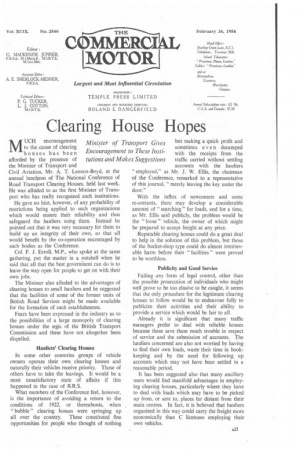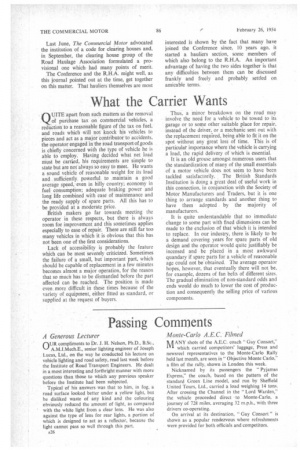Clearing House Hopes
Page 27

Page 28

If you've noticed an error in this article please click here to report it so we can fix it.
Minister of Transport Gives Encouragement to These Institutions and Makes Suggestions UCH encouragement to the.cause of clearing houses has been• afforded by the presence of the Minister of Transport and Civil Aviation, Mr. A. T. Lennox-Boyd, at the annual luncheon of The National Conference of Road Transport Clearing Houses, held last week. He was alluded to as the first Minister of Transport who has really recognized such institutions.
He gave no hint, however, of any probability of restrictions being applied to such organizations which would ensure their reliability and thus safeguard the hauliers using them. Instead he pointed out that it was very necessary for them to build up an integrity of their own, so that all would benefit by the co-operation encouraged by such bodies as the Conference.
Col. F. I. Erroll, M.P., who spoke at the same gathering, put the matter in a nutshell when he said that all that the best government can do is to leave the way open for people to get on with their own jobs.
The Minister also alluded to the advantages of Clearing houses to small hauliers and he suggested that the facilities of some of the former units of British Road Services might be made available for the formation of such establishments.
Fears have been expressed in the industry as to the possibilities of a large monopoly of clearing houses under the 02gis of the British Transport Commission and these have not altogether been dispelled.
Hauliers' Clearing Houses In some other countries groups of vehicle owners operate their own clearing houses and naturally their vehicles receive priority. Those of others have to take the leavings. It would be a most unsatisfactory state of affairs if this happened in the case of B.R.S.
What members of the Conference feel, however, is the importance of avoiding a return to the conditions of 1922, or thereabouts, when " bubble " clearing houses were springing up all over the country. These constituted fine opportunities for people who thought of nothing but making a quick profit and sometimes even decamped with the receipts from the traffic carried without settling accounts with the hauliers "employed," as Mr. J. W. Ellis, the chairman of the Conference, remarked to a representative of this journal, "merely leaving the key under the door."
With the influx of newcomers and some re-entrants, there may develop a considerable amount of "searching" for loads, and for a time, as Mr. Ellis said publicly, the problem would be the " loose " vehicle, the owner of which might be prepared to accept freight at any price.
Reputable clearing houses could do a great deal to help in the solution of this problem, but those of the bucket-shop type could do almost irretrievable harm before their " facilities " were proved to be worthless.
Publicity and Good Service Failing any form of legal control, other than the possible prosecution of individuals who might well prove to be too elusive to be caught, it seems that the only procedure for the legitimate clearing houses to follow would be to endeavour fully to publicize their activities and their ability to provide a service which would be fair to all.
Already it is significant that many traffic managers prefer to deal with reliable houses because these save them much trouble in respect of service and the submission of accounts. The hauliers concerned are also not worried by having to find their own loads, waste their time in bookkeeping and by the need for following up accounts which may not have been settled in a reasonable period.
It has been suggested also that many ancillary users would find manifold advantages in employing clearing houses, particularly where they have to deal with loads which may have to be picked up from, or sent to, places far distant from their main centres. In fact, it is believed that hauliers organized in this way could carry the freight more economically than C licensees employing their own vehicles_ Last June, The Commercial Motor advocated the institution of a code for clearing houses and. in September, the clearing house group of the Road Haulage Association formulated a provisional one which had many points of merit.
The Conference and the R.H.A. might well, as this journal pointed out at the time, get together on this matter. That hauliers themselves are most interested is shown by the fact that many have joined the Conference since, 10 years ago, it started a hauliers section, some members of which also belong to the R.H.A. An important advantage of having the two sides together is that any difficulties between them can be discussed frankly and freely and probably settled on amicable terms.
































































































































































































